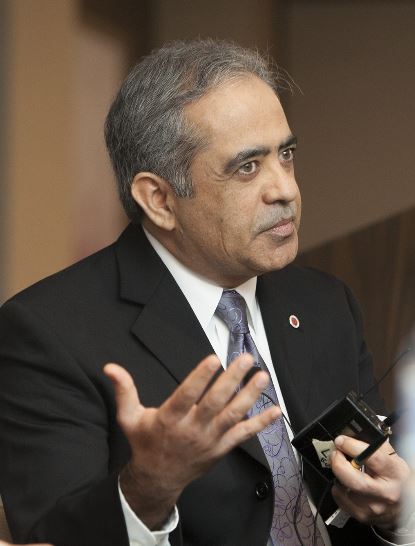Defining the New Luxury: Perspectives from Industry Leaders
By Chekitan S. Dev
Luxury is nothing new. The concept is ancient and global, at least for the privileged few who attained the special status of royalty.
The concept of premium accommodations for average consumers was pioneered by innovative hoteliers during the nineteenth century. During the years that have followed, the idea of a luxury hotel has been reinvented several times. Notable developments include the evolution of the luxury segment into branded chains over the past three decades.
Today the concept of a luxury hotel is arguably being transformed once again, as the consumer landscape becomes more democratized and the economic influence of new markets becomes more pervasive. A growing number of observers believe that a new era of luxury is upon us.
To explore this idea more deeply, a group of industry leaders convened a panel discussion during the ‘Hotel Show’ in New York during late 2012. In a series of animated exchanges over the course of an hour, the group shared their insights on defining the ‘New Luxury’ in hotels. A synopsis of this discussion follows.
ABOUT THE PANEL
A panel discussion entitled “Defining the New Luxury” occurred on November 12, 2012 at the Westin Times Square Hotel in New York City during the International Hotel, Motel and Restaurant Show.The panel members included Ellen Brown (Executive Vice President of Acquisitions and Development at the Denihan Hospitality Group), Richard Cotter (Managing Partner and Executive Vice President for Asset Management at the Brilla Group), Chris Hunsberger (Executive Vice President for Product and Innovation at Four Seasons Hotels & Resorts), and Joy Kull (then a specialist in wine merchandising with the Gilt Groupe). The discussion was moderated by Chekitan Dev (Associate Professor of Strategic Marketing and Brand Management in the School of Hotel Administration at Cornell University). The panel was organized by Liv Gussing Burgess (founder of the hospitality consulting firm Ripple), Raj Chandnani (Vice President for Strategy at the design firm WATG), and Regan Taikitsadaporn (Vice President of Human Resources, Asia Pacific at Marriott International) in affiliation with the Cornell Hotel Society. Nickie Fredenburg (from the School of Hotel Administration at Cornell University) took notes during the discussion.
What is the new luxury?
Joy Kull, in describing the new approach to luxury, suggested that communications are becoming more accessible. They are online, in your email inbox, or in a pop-up notification on your phone.
Most importantly, they are customized. Gilt.com is pioneering this idea with a customized homepage that is tailored to your previous purchases, the items you have clicked on, and your demographic profile.
Richard Cotter explained that, while the concept of luxury has historically been aspirational, the ‘new luxury’ is now more inspirational, in the same way that couture design inspires the fashion industry. Using the term “bespoke” to define the new luxury, he compared emerging luxury hospitality services to being custom-fitted for a pair of shoes or a suit on Savile Row in London.
Chris Hunsberger defined ‘new luxury’ as a focus on consistency, while still providing individualized experiences.
Ellen Brown observed: “Luxury is less formal and materialistic since the downturn. Service is not only customized, but kinder and gentler. Guests appreciate service that is instinctive, not scripted.”
Is luxury a function of geography, ethnicity, or gender?
Cotter argued that geography is important, especially in seasonal locations. The adaptation of standards to patterns of demand is critical, but such standards must never be compromised below a “base of luxury” during the low season.
Brown observed that the new luxury customer is globally minded and culturally aware, so there are more similarities than differences among the different market segments.
Kull stressed that Gilt does not sacrifice quality when reaching out to different groups. In adding to the customization theme, she shared that Gilt Groupe personalizes products, services, and messages differently for men and women
How do you engage with new luxury customers?
Hunsberger suggested using a broad digital platform to engage with guests, observing: “You need to be where the customers want you to be.” Others echoed this sentiment and endorsed a broad portfolio of communication channels, including both legacy and social media, to engage with the new luxury guest. All agreed that mobile technologies are a key platform for further development.
Are boomers and millennials buying differently?
Kull stated her belief that younger luxury customers are a rapidly growing group that is more technologically savvy than predecessors. She revealed that “millennials” are her core consumers, and that Gilt is very careful how they represent luxury brands to this group. “We aren’t looking to tarnish [any] brand by offering discounted hotel rooms or wine,” she explained.
Hunsberger continued on this theme, suggesting: “Millennials are our future customers and many of us aspire to be like them, so we need to pay attention to them.” However, he cautioned that there are older millennials and younger millennials, young boomers and old boomers, each group having different needs and wants. Hunsberger revealed that Four Seasons has adopted relaxed grooming standards for staff, which are designed to appeal to younger guests. As an example, he shared that bartenders at the George V Hotel in Paris are allowed to have visible tattoos.
What are the products and services desired by the new luxury customer?
Cotter observed that his hotels are providing more amenities for customers, partly due to travel becoming more difficult and people becoming unable to pack certain items due to security procedures. This goes beyond mere bathroom amenities, to include customized guest rooms with special clothing and family photos staged in the room prior to arrival.
Brown added that luxury is no longer about how many amenities are placed in rooms. Rather, guests today feel enriched by what they return home with experientially. Aspirational experiences are the new equivalent of the luxury car in the driveway. She observed: “It’s up to us to provide access to those touch points and opportunities.” Brown also pointed out the increasing importance of local items to her guests. “People enjoy [local experiences] and want to try local foods,” she explained. In addition, she stressed the importance of aesthetics: “When you walk into a hotel and see a beautiful piece of art, it brings a smile to your face which is a big aspect of luxury.”
Kull suggested that her new luxury customers are brand-driven. “People are less likely to respond and purchase if the brand is lesser known, especially for wine,” she explained, encouraging brand managers to pay attention to building great brands.
What is the importance of time to the new luxury customer?
Hunsberger stressed that “time is of the essence” for the new luxury guest, and described the new 15-minute room service delivery guarantee at Four Seasons. “Customers do not want to wait,” he stated. He also described other ways that Four Seasons respects guest time, such as focusing on polite but quick encounters with room attendants.
How does design and technology influence relationships with the new luxury customer?
All the panelists touched on the importance of superbly equipped and naturally lit spaces, and state of the art communication technology. They also mentioned a balance of elegant design, while keeping comfort in mind when offering amenities for guests.
Everyone agreed that an opportunity existed to re-imagine the traditional arrival and check-in experience. Hunsberger shared that Four Seasons is experimenting with ‘in-car’ arrival processes using a tablet device.
How is customization being used to serve the new luxury customer?
Cotter indicated that his firm is placing additional emphasis on knowing more about its customers and adapting to their needs. He observed: “In some [instances], there are no limits to what we will do to accommodate a guest request.” Cotter stressed the importance of pre-arrival procedures to customize the stay as soon as the reservation is made, and cited the example of obtaining a bottle of rare vintage wine for a guest.
Brown concurred, suggesting: “Guests want to create their own worlds within ours, [constituting] a departure from traditional, cookie-cutter luxury brand experiences. They want a customized experience, which makes it essential for us to be a customer-centric company.”
What constitutes value for new luxury customers?
Several panelists stressed that the new luxury guest does not want to be “nickeled and dimed” in terms of billing for products and services. Cotter offered an example of guests who are willing to pay $1,500 per night for a room, but do not want to pay $15 for a glass of fresh-squeezed orange juice. Everyone agreed that luxury hotels must provide novel and differentiated guest experiences that are reasonably priced, culturally connected, and casually delivered in supreme comfort.
This was followed by a spirited discussion about luxury hotels charging for internet access. Cotter predicted that eventually internet access will be completely free in luxury hotels, but noted challenges, such as guests who leave their computer on all the time, affecting access availability and speed for others. “If we charge for internet access, unnecessary Wi-Fi connectivity decreases,” he explained.
Does the new luxury guest care about being green?
There was unanimous agreement that environmental or ‘green’ consciousness is very much in vogue. Kull observed that Gilt customers are becoming more aware of ‘green’ hotels and organic foods when making online purchases. Brown spoke about the increasing importance of environmental certification programs, such as LEED. Cotter urged everyone to think beyond ‘green’ to a wider array of socially responsible initiatives.



3 comments
Amazing info! black leather jacket men
Thank You For Sharing furnace installation Mississauga
game portal: QH88